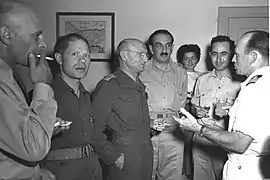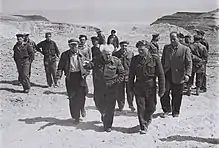Moshe Tzadok
Moshe Lehrer Tzadok (sometimes spelled Moshe Zadok; Hebrew: משה צדוק (לֶרֶר); July 1, 1913 - March 15, 1964[1]) was Haganah fighter and later an IDF major general, first head of the Manpower Directorate during the 1947–1949 Palestine war,[2] and head of the Israeli Northern and Southern Command during the early 1950s.[3] After retiring from the IDF, Tzadok became the head of the Division of Interior and Construction of the Ministry of Defense.
Moshe Tzadok | |
|---|---|
 Moshe Tzadok (2nd from the left), November 9, 1949 | |
| Native name | משה צדוק |
| Birth name | Moshe Lehrer Tzadok |
| Born | July 1, 1913 Radom, Poland |
| Died | March 15, 1964 (aged 50) Israel |
| Buried | |
| Allegiance | |
| Service/ | |
| Years of service | 1933 - April 1956 |
| Rank | |
| Commands held |
|
| Battles/wars | |
| Spouse(s) | Hadassah Petrushka (Hebrew: הדסה פטרושקה) |
| Other work | Head of the Division of Interior and Construction of the Ministry of Defense |
Biography
Tzadok was born on July 1, 1913 to Mendel and Nechama Lehrer in a small town of Żelechów near Radom, Poland.[1][4] After completing his junior year, Tzadok continued his education in a vocational school sponsored by ORT in Warsaw, the capital of Poland.
Tzadok became a Zionist from the age of 14 when he joined the Zionist youth movement in his hometown. In 1933 Tzadok immigrated to Israel.[4] Soon after arriving in Israel he joined the Haganah. In 1936 he graduated from the Juara training base in Ramat Menashe, in northern Israel.[1]
During the early 1940s Tzadok became a prominent member of the Jewish Combat Organization. Prior to the Haganah's capture of Haifa, he served as the Fire chief of the Haifa Fire Department which facilitated covert Haganah operations in the city. Additionally, he thought Haganah courses.[1]
Tzadok became the first head of the Manpower Directorate in May 1947, shortly after its foundation.[5] Tzadok continued to serve in that capacity with the rank of Aluf after the formation of the Israel Defense Forces on June 27, 1948.[6] In the summer of 1949 he married Hadassah Petrushka. The couple had no children.
In 1950 Moshe was appointed Inspector General of the IDF and in March of that year he became the commander of the Eighth Command which was established to organize military reserve in the Tel Aviv area. On October 17, 1951 he was appointed head of the Southern Command, a position he held until February 1, 1954.[4] He was then appointed head of the Israeli Northern Command[7] until April 20, 1956 when he was released from his service in the army after 23 years of military service. His position was taken over by Yitzhak Rabin.[8]
Later years and death

In 1957, at the age of 44 after passing the Bagrut he started learning at the Faculty of Economics and Political Science at the Hebrew University.[1] He graduated in 1960 and in 1961 he was appointed head of the Division of Interior and Construction of the Ministry of Defense.[4] Moshe Zadok died of an illness in 1964, at the age of 50. He was buried in Kiryat Shaul Military Cemetery
References
- "צדוק (לרר) משה". The State of Israel, Ministry of Defense. Retrieved 22 January 2014.
- Milstein, Uri (1997). Alan Sacks (ed.). History of the War of Independence: The first month. University Press of America. p. 264. ISBN 9780761807216. Retrieved 25 January 2014.
- David Ben-Gurion. "Proclaiming Independence: Five Days in May from Ben-Gurion's Diary" (PDF). Retrieved 22 January 2014.
- "מת האלוף משה צדוק". Maariv. March 15, 1964. Retrieved 22 January 2014.
- Moshe, Naor (2008). "Israel's 1948 War of Independence as a Total War". Journal of Contemporary History. 43 (2): 241–257. doi:10.1177/0022009408089031.
- "הקמת צה"ל". The State of Israel, Ministry of Defense. Retrieved 22 January 2014.
- "Meeting of the General Staff" (PDF). Ministry of Defense. July 27, 1954. Retrieved 22 January 2014.
- Northern Command - April 1956 - April 1959 (PDF). Retrieved 22 January 2014.